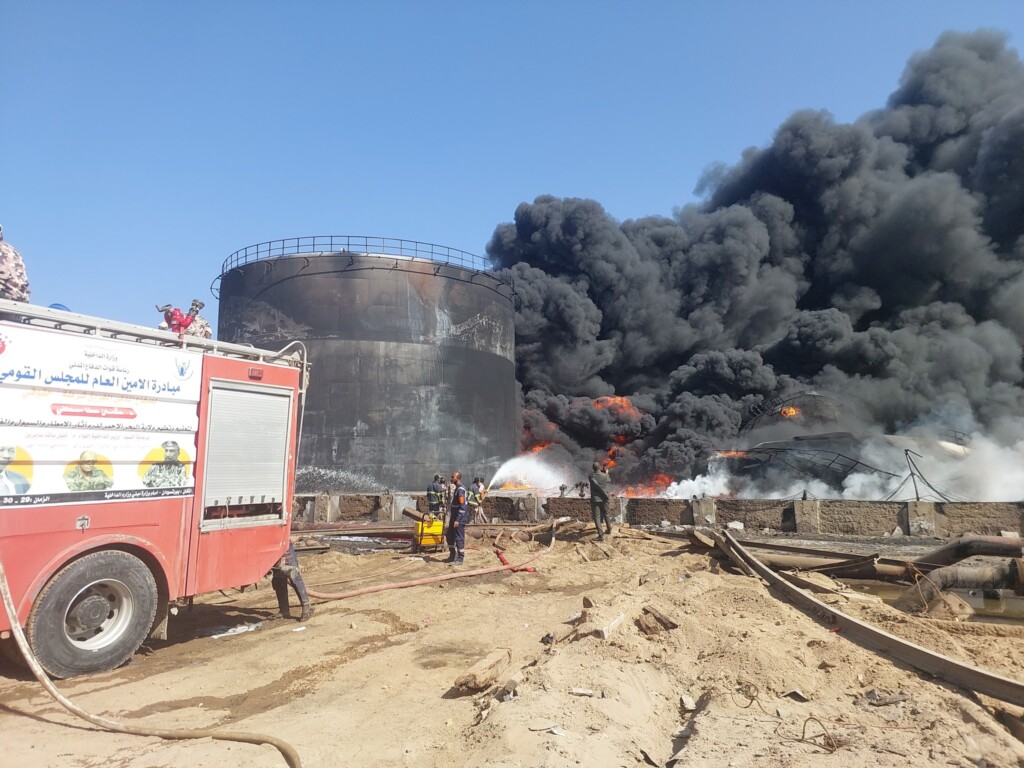Sudan Media Forum: ‘RSF drone strikes on Port Sudan expose SAF defences’

Flames engulf a strategic fuel warehouse in Port Sudan following an alleged drone strike by the paramilitary Rapid Support Forces, May 6 2025 (Photo: Ministry of Energy via Facebook)
Drones operated by the paramilitary Rapid Support Forces (RSF) have been flying over Port Sudan almost daily, a month after launching the first wave of coordinated drone strikes targeting the Sudanese Armed Forces (SAF) in the east of the country. The strikes, which took place between 4 and 6 May, marked a turning point in the conflict, dealing strategic blows to the de facto capital of the SAF.
The RSF drone strikes hit an ammunition depot at Osman Digna airbase, fuel tanks south of the city, and a transformative power station. On 6 May alone, it struck the Marina Hotel, private oil depots near the southern port, and the Flamingo naval base.
The drone attacks disrupted civil aviation, triggered tighter military restrictions, and led the SAF to warn South Sudan that it may shut down the oil export pipeline due to risks to critical infrastructure.
Brig Gen (Ret.) Adel Abdel Latif, a former Sudanese Air Force officer, described the attacks as “a paradigm shift in the conflict.” He told Sudan Tribune that the aircraft used are likely MALE-class drones (medium altitude, long endurance), capable of “flying for 30 hours at 30,000 feet, and carrying out complex intelligence and combat missions.”
He said the RSF “hit their targets with extreme accuracy,” and added that some of the drones may have been equipped with jamming technology to evade air defences.
Accusations
As strikes neared government buildings, the Sudanese Defence and Security Council accused the United Arab Emirates (UAE) of backing the RSF.
Sudan’s Ministry of Foreign Affairs echoed the charge. At the United Nations, Sudan’s Permanent Representative Ambassador El Haris Idris went further, accusing the UAE of launching MQ-9-class drones from Red Sea bases “at the request of the RSF.” Military sources aligned with the army reported similar intelligence.
However, Abdel Latif offered a more technical interpretation. He said a launch from the Red Sea “does not necessarily mean coming from outside the country,” explaining that “approximation to the sea gives the aircraft a better opportunity for manoeuvre and positioning and facilitates their return to the launch base.”
‘SAF weakness exposed’
The strikes revealed critical weaknesses in the SAF’s air defences. According to military sources, effective countermeasures were not deployed until the fourth day of the assault, when the army began using ground-based calibres that forced drones to higher altitudes. The RSF has since continued conducting surveillance and reconnaissance over the city.
Security in Port Sudan has tightened. Movement around government buildings is restricted, public appearances by officials have been scaled back, and journalists have been banned from filming in public. Night-time civil aviation is suspended.
Abdel Latif said the RSF has “conducted strategic strikes on vital sites—airports, dams, power stations—which directly affect the army’s ability to finance and continue its war.” In contrast, he said the army’s drone use remains limited to the tactical level.
He warned that Sudan “lost its almost absolute control over the airspace,” saying air superiority is now contested. “Countering these attacks requires air force and integrated air defence—which seems not currently available.”
‘No decisive victory possible’
Abdel Latif concluded that a military resolution is increasingly unlikely. “Achieving a decisive victory for either party is exploitable given the difficulty of compensating for losses, especially in the air force, which requires huge resources and a long time to compensate for its pilots and equipment.”
He urged both sides to end the conflict: “Seek to stop the war, the bloodshed, and the draining of the country’s human and economic capabilities.”

This article was published by the Sudan Media Forum in collaboration with Sudan Tribune, as part of efforts to raise awareness of the war’s toll after 26 months of conflict, the collapse of basic services, and the spread of disease and displacement.
#SilenceKills #الصمت_يقتل #NoTimeToWasteForSudan #الوضع_في_السودان_لايحتمل_التأجيل #StandWithSudan #ساندوا_السودان #SudanMediaForum #PressFreedom








 and then
and then